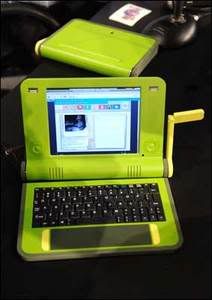Adil Najam
This is not a crazy idea: What would the world be in 20 years if each child growing up in today’s developing countries had access to a computer and internet, and being connected to knowledge sources locally as well as across the globe? Is it possible? Is it even affordable? and what good can a computer bring to communities where roti, kapra, makan are still the fundamental unmet needs.
Well, one visionary has an idea, and his idea is gaining popularity across the globe. That visionary is Nicholas Negroponte, a professor at MIT’s Media Lab, who envisioned an educational eco-system for children in the developing parts of the world that revolves around the use of computers and connectivity.
He wanted to see a future where children in developing countries were not left perennially behind because they simply did not have access to the tools that others in affluent countries did. Aware of the economic situation in most parts of the world that has given the term digital divide a new meaning, Negroponte envsioned a laptop that would be available to children at a cost of less than 100 dollars.
The vision pf Negroponte, and the non profit organization One Laptop Per Child (OLPC) that he created, is not just to promote another tech tool with overpromises of benefits – but to boldy address the critical technical and economic research areas that have hampered the availability of digital tools for the developing world. Ever since the first declaration at the World Economic Forum in Davos 2005, OLPC has set out to create a world class performance laptop that is not only unbelievably cheap, also creates a system for education and development of children who use them.
The $100 laptop is a mobile platform for kids, complete with a rugged weather proof casing, a color & black and white sun-light reable screen, 500 MHz processor, 128MB of DRAM and 500MB of flash memory. The laptops will have wireless internet, which will allow them to link up with mesh networks, allowing neighboring users to ‘talk’ to each other and create networks.
Nicholas Negroponte and the OLPC organization believe that “Laptops are both a window and a tool: a window into the world and a tool with which to think. They are a wonderful way for all children to learn learning through independent interaction and exploration.” OLPC learnt that it would be possible to reduce the cost of the laptop to $100 only if millions of them were made (not to mention the many innovations in technologies that had to be done along the way). The mode they have adopted for reaching millions of children was by targeting a few countries that had large populations and represented different parts of the world: India, China, Egypt, Nigeria, Brazil, Argentina and Thialand were chosen as the initial partner countries.The laptops would be sold to the governments in these countries and then issued by the governments to schools on a One Laptop Per Child basis.
This initiative has gained a lot of momentum, but has also seen some opposition. The largest opposition came from what the OLPC members sometimes fondly call the Microsoft/Intel block which was unhappy that OLPC chose to go with a Linux system software and  AMD chips. The reality is that Microsoft and Intel were also given a chance to join the movement early, but they passed on it, thinking it was just a crazy idea. Now they sense competition in some of their largest markets and are fircely lobbying governments against OLPC. In a recent move, India announced that it was withdrawing from the project, citing unsatisfactory expectations from the pedagogical theories.
AMD chips. The reality is that Microsoft and Intel were also given a chance to join the movement early, but they passed on it, thinking it was just a crazy idea. Now they sense competition in some of their largest markets and are fircely lobbying governments against OLPC. In a recent move, India announced that it was withdrawing from the project, citing unsatisfactory expectations from the pedagogical theories.
However, some recent successes have bolstered the committment of OLPC core team members. Other countries are willing an dready to sign onto the project and the first prototype units (displayed in the photo attached here) are going to be tested in Thailand very soon. Argentina, Nigeria and Brazil are also signed up up for the delivery of millions of laptops. China and Egypt are still negotiating, and guess what, OLPC team has recently showed interest in talking to Pakistan as well. Some of us are trying to reach out to government officials to get them interested in at least learning from OLPC. I hope it will be given a serious thought by them.
I am very interested in hearing what the development community in Pakistan thinks of such projects, and if they have any experiences with introductions of digital gadgets into the hands of people from less-developed and more rural areas of the country. Do we need more tree-schools, or better training for teachers, or laptops with internet connectivity for both generating and accessing local knowledge? Gervase Merkham of Times Online, I think, sums up the OLPC philosophy and intent quite well:
Being connected changes the way people use computers. Before the internet, the data on a computer was mostly either there when it arrived, or created by the owner. Today, the vast majority of the information which flows past our eyes comes from somewhere else – which could be a different country, a different culture, a different perspective. Our biggest problem has changed; it used to be tracking down the oases of information. It’s now working out how to drink from the water cannon of knowledge. But given tools to manage the flow, no child should ever waste their time trying to turn lead into gold.
OLPC’s greatest gift to those children will not be the computer itself, but the ability to document, publish, share and build. When every child has a laptop, the chatter of a hundred million keyboards will deafen the world.
For additional information, visit:
OLPC; PCs for the poor: which design will win; Getting the World’s poor logged on
Podcast of Walter Bender’s (OLPC President) MURJ lecture on One laptop per child
 Bilal Zuberi
Bilal Zuberi 


















































Good article, I’ve been following this project for a while. It was quite interesting to hear Bill Gates’ take on this…he basically said that the kids would be behind the rich kids because they would be using an inferior operating system. I can see it now, the Simputer kids hacking their way through Linux, using such el33t commands like cat, top, grep, rm -rf / (btw, try that if you use linux) such and such while the wealthy kids are busy looking at useless crap like 3-D window switches.. (coming in Vista).
Personally, I think the hand-crank is the best thing about those laptops. I read somewhere that there is not enough energy in the world (i.e. considering current sources of energy from fossil fuels, etc) to power computers for even half of the world’s children!
I can see it now, the Simputer kids continuing to hack away on their Linux boxes while the richer kids wait for the power to come on….
I bet even Bilal’s barber could buy one of these laptops…..imagine that, getting your hair cut while you play tetris.
May be you should have one more column in the sury; Non of the Above. No?
Personally, I support the Simputer idea because it addresses my concern about more general access to the devices and the technology.
This is a very noble idea. However, I have many unanswered questions and I’m hoping someone on this blog can answer them:
1. Who will manufacture these computers in such huge numbers?
2. Who is financing this initiative and who gets to keep the $$? If it is funded by the respective govts, I can already sense massive corruption.
3. Who will support these computers on an ongoing basis on such a mass scale? About $5-10/year is required to maintain and support these computers on an ongoing basis.
Indian engineers have been working on a cheap PDA style device for a while for India’s mass market . It has evolved quite a bit since the early days of the device – http://www.amidasimputer.com/, Its called the Amida. Since this device is now ready for prime time, that could be a reason why NN’s PC project was shelved.
Also, a while ago, NN estbalished the MIT Media Lab in India with the blessings of the Indian Govt. Nothing much came out of that initiative and that led to a lot of bad blood between NN and Govt of India. The Media Lab Initiative was ultimately dissolved.
Ultimately, the problems of digital divide in developing countries can be addressed only by people from their own countries. You cannot bring some messiah like Nicholas Negroponte to be parachuted from Cambridge to solve the technology problems of the developing world.
I dunno man. I have been incubating a post for my own blog on this. And I keep coming back to this: Why is Negroponte so set on preventing anyone else from getting a 100 dollar PC, besides poor kids? If you’re not a kid, you’re not deserving if poor? Or if you’re not poor, you’re not a deserving kid? Or, more generally, despite the fact that one could get a perfectly working PC for 100 bucks, my father or 3 billion other people who live in the “Third World” MUST pay a jagga tax to Billy G and other robber barons … for what reason now?
It smacks of–and I think is just the 21st century version of–blood-sucking colonialism (excuse my frankness), if you ask me: We’re going to use your cheap labour but not going to give you the full benefit of it. And then be beatified in our old age because we’re going to give what we deprived whole nations of to a few poor kids…
Sorry about the morbidity; but that’s what I feel on this.
The other thought was when I saw Billy G and his CEO denounce NN’s 100 PC in the same week. That was when I thought “Aha! So it really IS possible.”